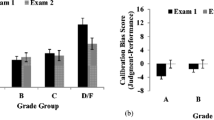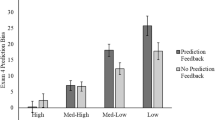Abstract
Three field studies tested the hypothesis that anticipating a graded test as opposed to a pass-fail test enhances metacognitive monitoring. Participants were teacher candidates who completed a mid-term and a final test in psychology courses. Each participant chose whether the result of the final test should be evaluated with one of five grades or with a pass-fail decision. In both tests, participants answered true–false inference items about the contents of the course and indicated their confidence in the correctness of each answer. When a graded test was expected, confidence and the absolute accuracy of the confidence judgments increased and bias decreased to a greater extent than when a pass-fail decision was expected. However, expecting a grade increased participants’ confidence not only in correct answers but also in incorrect answers (Study 1). Feedback and instructions emphasizing the importance of accurate discrimination between correct and incorrect answers did not weaken this effect (Study 2). The generalizability of the findings was investigated by reanalyzing the test results of participants in eight other psychology courses (Study 3). The results are discussed in terms of the motivational consequences of grading.

Similar content being viewed by others
Notes
It should be noted that confidence, in the present context, is conceptualized as a metacognitively based judgment in actual cognitive activities, usually measured as an item-specific judgment of the probability of answering a specific item correctly, and not as a personality trait describing the trans-situational disposition of being self-assured or self-confident (for a discussion of the different concepts of confidence in psychological research see e.g., Stankov and Kleitman 2008).
References
Allwood, C. M., Granhag, P. A., & Jonsson, A.-C. (2006). Child witness’ metamemory realism. Scandinavian Journal of Psychology, 47, 461–470.
Ames, C. (1992). Classrooms: goals, structures, and student motivation. Journal of Educational Psychology, 84, 261–271.
Butler, R. (1987). Task-involving and ego-involving properties of evaluation: effects of different feedback conditions on motivational perceptions, interest, and performance. Journal of Educational Psychology, 79, 474–482.
Butler, R. (2006). Are mastery goals and ability goals both adaptive? Evaluation, initial goal construction and the quality of task engagement. British Journal of Educational Psychology, 76, 595–611.
Butler, R., & Nisan, M. (1986). Effects of no feedback, task-related comments, and grades on intrinsic motivation and performance. Journal of Educational Psychology, 78, 210–216.
Butler, A. C., Karpicke, J. D., & Roediger, H. L., III. (2008). Correcting a metacognitive error: feedback increases retention of low-confidence correct responses. Journal of Experimental Psychology: Learning, Memory, and Cognition, 34, 918–928.
Clark, C. (1969). Competition for grades and graduate-student performance. The Journal of Educational Research, 62, 351–354.
Dutke, S., & Barenberg, J. (2009). Ökonomisch anwendbare Wissenstests für teilnehmerreiche Psychologieveranstaltungen [Economical knowledge tests for psychology courses with great attendance]. In M. Krämer, S. Preiser, & K. Brusdeylins (Eds.), Psychologiedidaktik und Evaluation VII (pp. 367–376). Aachen (Germany): Shaker.
Dutke, S., Barenberg, J., & Leopold, C. (2010). Learning from text: knowing the test format enhanced metacognitive monitoring. Metacognition and Learning, 5, 195–206.
Dweck, C. S. (1986). Motivational processes affecting learning. American Psychologist, 41, 1040–1048.
Elliot, A. J. (1999). Approach and avoidance motivation and achievement goals. Educational Psychologist, 34, 169–189.
Elliot, A. J., & Harackiewicz, J. M. (1996). Approach and avoidance achievement goals and intrinsic motivation: A mediational analysis. Journal of Personality and Social Psychology, 70, 461–475.
Elliot, A. J., & McGregor, H. A. (2001). A 2 × 2 achievement goal framework. Journal of Personality and Social Psychology, 80, 501–519.
Ghatala, E. S., Levin, J. R., Foorman, B. R., & Pressley, M. (1989). Improving children’s regulation of their reading PREP time. Contemporary Educational Psychology, 14, 49–66.
Gigerenzer, G. (1991). How to make cognitive illusions disappear: beyond “Heuristics and Biases”. European Review of Social Psychology, 2, 83–115.
Gigerenzer, G., & Murray, D. J. (1987). Cognition as intuitive statistics. Hillsdale, NJ: Erlbaum.
Gigerenzer, G., Hoffrage, U., & Kleinbölting, H. (1991). Probabilistic mental models: a Brunswikian theory of confidence. Psychological Review, 98, 506–528.
Gonzales-Vallejo, C., & Bonham, A. (2007). Aligning confidence with accuracy: revisiting the role of feedback. Acta Psychologica, 125, 221–239.
Hacker, D. J., Bol, L., Horgan, D. D., & Rakow, E. A. (2000). Test prediction and performance in a classroom context. Journal of Educational Psychology, 92, 160–170.
Hales, L. W., Bain, P. T., & Rand, L. P. (1973). The pass–fail option: the congruence between the rationale for and student reasons in electing. The Journal of Educational Research, 66, 295–298.
Harackiewicz, J. M., Manderlink, G., & Sansone, C. (1992). Competence processes and achievement motivation: Implications for intrinsic motivation. In A. K. Boggiano & T. S. Pittman (Eds.), Achievement and motivation: A social-developmental analysis (pp. 115–137). New York, NY: Cambridge University Press.
Johnson, B. G., & Beck, H. P. (1988). Strict and lenient grading scales: how do they affect the performance of college students with high and low SAT scores? Teaching of Psychology, 15, 127–131.
Juslin, P., Olsson, N., & Winman, A. (1996). Calibration and diagnosticity of confidence in eyewitness identification. Comments on what can be inferred from the low confidence-accuracy correlation. Journal of Experimental Psychology: Learning, Memory, and Cognition, 22, 1304–1316.
Karlins, J. C., Kaplan, M., & Stuart, W. (1969). Academic attitudes and performance as a function of differential grading systems: an evaluation of Princeton’s pass-fail system. The Journal of Experimental Education, 37, 38–50.
Kettle, K. L., & Häubl, G. (2010). Motivation by anticipation: expecting rapid feedback enhances performance. Psychological Science, 21, 545–547.
Kleitman, S. (2003). Bias score—an instance of systematic irrationality? In P. Slezak (Ed.), Proceedings of joint international conference on cognitive science (pp. 311–317). Sydney: University of New South Wales.
Kluger, A. N., & DeNisi, A. (1996). Effects of feedback intervention on performance: a historical review, a meta-analysis, and a preliminary feedback intervention theory. Psychological Bulletin, 119, 254–284.
Lipnevich, A. A., & Smith, J. K. (2009). Effects of differential feedback on students’ examination performance. Journal of Experimental Psychology, 15, 319–333.
Maki, R. H., Shields, M., Wheeler, A. E., & Zacchilli, T. L. (2005). Individual differences in absolute and relative metacomprehension accuracy. Journal of Educational Psychology, 97, 723–731.
Miesner, M. T., & Maki, R. H. (2007). The role of test anxiety in absolute and relative metacomprehension accuracy. European Journal of Cognitive Psychology, 19, 650–670.
Moore, D. A., & Healy, P. J. (2008). The trouble with overconfidence. Psychological Review, 115, 502–517.
Nicholls, J. G. (1984). Achievement motivation: conceptions of ability, subjective experience, task choice, and performance. Psychological Review, 91, 328–346.
Nietfeld, J. L., Enders, C. K., & Schraw, G. (2006). A Monte Carlo comparison of measures of relative and absolute monitoring accuracy. Educational and Psychological Measurement, 66, 258–271.
Pulfrey, C., Buchs, C., & Butera, F. (2011). Why grades engender performance-avoidance goals: the mediating role of autonomous motivation. Journal of Educational Psychology, 103, 683–700.
Remedios, R., Lieberman, D. A., & Benton, T. G. (2000). The effects of grades on course enjoyment: did you get the grade you wanted? British Journal of Educational Psychology, 70, 353–368.
Schraw, G. (2009). A conceptual analysis of five measures of metacognitive monitoring. Metacognition and Learning, 4, 33–45.
Schraw, G., Potenza, M. T., & Nebelsick-Gullet, L. (1993). Constraints on the calibration of performance. Contemporary Educational Psychology, 18, 455–463.
Sinkavich, F. J. (1995). Performance and metamemory: do students know what they don’t know? Journal of Instructional Psychology, 22, 77–87.
Stankov, L., & Kleitman, S. (2008). Processes on the borderline between cognitive abilities and personality: Confidence and its realism. In G. J. Boyle, G. Matthews, & D. Saklofske (Eds.), The handbook of personality theory and testing (pp. 541–555). Thousand Oaks: Sage Publications.
Thiede, K. W. (1999). The importance of monitoring and self-regulation during multitrial learning. Psychonomic Bulletin and Review, 6, 662–667.
Thiede, K. W., & Anderson, M. C. M. (2003). Summarizing can improve metacomprehension accuracy. Contemporary Educational Psychology, 28, 129–160.
Thiede, K. W., Anderson, M. C. M., & Therriault, D. (2003). Accuracy of metacognitive monitoring affects learning of texts. Journal of Educational Psychology, 95, 66–73.
Winne, P. H., & Hadwin, A. F. (1998). Studying as self-regulated learning. In D. J. Hacker, J. Dunlosky, & A. C. Graesser (Eds.), Metacognition in educational theory and practice (pp. 227–304). Mahwah, NJ: Erlbaum.
Winne, P. H., & Jamieson-Noel, D. (2002). Exploring students’ calibration of self reports about study tactics and achievement. Contemporary Educational Psychology, 27, 551–572.
Author information
Authors and Affiliations
Corresponding author
Additional information
Author note
Thanks are due to our colleagues in the Institute of Psychology in Education at the University of Muenster for discussion and helpful comments during the preparation of this manuscript.
Appendices
Appendix 1
The indices of metacognitive monitoring accuracy were computed according to the following formulas:
-
(1)
absolute accuracy of the confidence judgments (AC):
$$ AC=\frac{a+d }{a+b+c+d } $$ -
(2)
bias of the confidence judgments (BS):
$$ BIAS=\frac{{\left( {a+b} \right)-\left( {a+c} \right)}}{a+b+c+d } $$ -
(3)
confident-correct probability (CCP):
$$ CCP=\frac{a}{a+c } $$ -
(4)
confident-incorrect probability (CIP):
$$ CIP=\frac{b}{b+d } $$ -
(5)
discrimination between correct and incorrect decisions (DIS):
$$ DIS=CCP-CIP $$
The attributes of the answer to each item (correct or incorrect, confident or unconfident) were coded as 1 (given) or 0 (not given).
Appendix 2
Written instructions given to the participants (translated from German):
Below you will find statements some of which are true and some are false. Please indicate for each statement whether you think it is true or not. Additionally, please indicate whether you are sure or unsure that your answer is correct:
-
If you are sure that the statement is false, check the first box in the right of the word (“No”).
-
If you think the statement may be false, but you are not sure, check the second box (“No?”).
-
If you think the statement may be true, but you are not sure, check the third box (“Yes?”).
-
If you are sure that the statement is true, check the fourth box (“Yes”).
Please note that the test score reflects the correctness of your answers and the confidence in your answers:
-
If your answer is correct and you are sure, this answer will be scored with +2 points.
-
If your answer is correct but you are not sure, this answer will be scored with +1 point.
-
If your answer is incorrect but you are not sure, this answer will be scored with −1 point.
-
If your answer is incorrect and you are sure, this answer will be scored with −2 points.
Please answer each item. Unanswered items will be scored with −2 points.
Rights and permissions
About this article
Cite this article
Barenberg, J., Dutke, S. Metacognitive monitoring in university classes: anticipating a graded vs. a pass-fail test affects monitoring accuracy. Metacognition Learning 8, 121–143 (2013). https://doi.org/10.1007/s11409-013-9098-3
Received:
Accepted:
Published:
Issue Date:
DOI: https://doi.org/10.1007/s11409-013-9098-3




